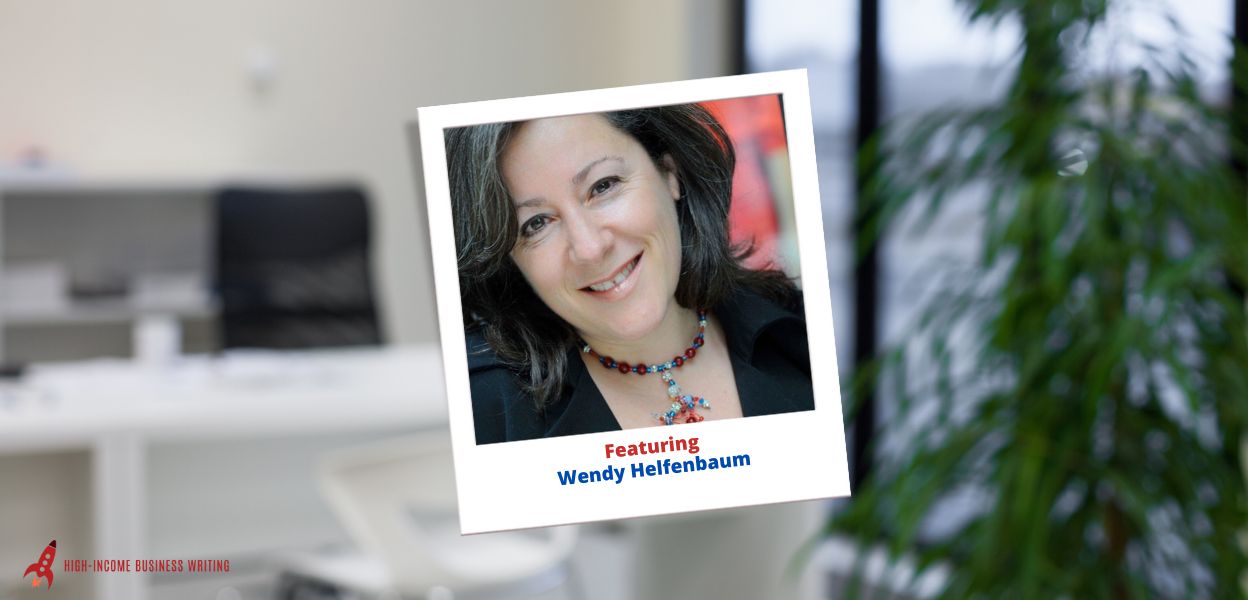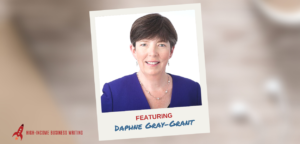Freelancing is amazing. Until it isn’t.
You wake up one morning and you realize that you’ve created a very demanding job for yourself.
And chances are, you take LESS time off than you ever did in any previous job you held.
Sometimes it even feels like you’re working for a tyrannical boss who makes you feel terrible any time you ask for a small break.
That boss, by the way, is YOU.
Sound familiar?
Not to Wendy Helfenbaum, my guest in this week’s episode. Wendy is an established freelance writer out of Montreal. And for the past 18+ years she has taken 4 months off every year.
And when I say “time off,” I mean real, non-working time off. No client work. No working on the business. No marketing. No nothing.
Just time to be with her family. To decompress. To enjoy life. And to savor the freedom freelancing is supposed to afford us.
Just as impressive, Wendy has consistently maintained a 6-figure income for years—even while taking a full third of the year off.
I was super-excited to bring Wendy on the show to tell us how she does this. It was a very lively and insightful conversation. I learned so much, and I can’t wait for you to hear it.
This is a great follow-up to the wonderful conversation I had last month with Satta Sarmah Hightower, where Satta discussed how she was able to take a 4-month maternity leave recently. If you haven’t listened to that episode, I urge you to give it a listen, because it complements this week’s episode really well.
The notes that follow are a very basic, unedited summary of the show. There’s a lot more detail in the audio version. You can listen to the show using the audio player below. Or you can subscribe on Apple Podcasts, Spotify, Stitcher, Google Podcasts, Amazon Music or wherever you listen to podcasts.


High-Income Business Writing with Ed Gandia
#346: How Wendy Helfenbaum Takes 4 Months Off Every Year While Maintaining a Healthy 6-Figure Income
Key Topics and Bullets:
- Balancing income streams from journalism and content marketing
- Taking time off and maintaining a balanced work-life routine
- Planning and financial goal-setting for time off
- Transitioning to a semi-retirement phase
- Planning time off throughout the year
- Managing client expectations and workload during time off
- Understanding productivity and setting boundaries for time off
- Strategies for avoiding burnout and prioritizing self-care
- Changing the mindset about finding clients
- Consistently marketing to maintain a steady flow of work
- Taking ownership of marketing efforts and building referral networks
- Turning marketing into a game and motivating oneself for marketing tasks
- Embracing the changing idea of retirement
- Pursuing important goals with planning and resilience
- Front loading work for retainer clients
Timestamp Overview:
06:07 Wendy: My son and I went up to the cottage and spent the entire summer there, and I did not crack open my laptop. And it was the most transformative experience that I’ve had in a long time. I realized, wow, this is something I have to make happen every year. And so I sat down that 1st summer and did some math. How much do I have to make? What happens if I take June through Labor Day off? What does that mean for the rest of the time? How can I manage my income? And I realize that it’s actually really doable if you plan it out. Now, hope is not a strategy. Wishing is not a strategy.
06:48 Wendy: You have to sit down with an Excel spreadsheet or whatever system you want and figure out how much you have to make to the system you want and figure out how much you have to make to sustain you if you take a certain amount of weeks off. After that 1st summer, I started realizing I also wanted to take off several weeks at Christmas, several weeks during March break when my son was off school and every other, you know, professional day where the school was closed and the teachers weren’t there, I turned into an adventure day with my son. And before I knew it, I was up to 16 weeks off a year, and yet I was consistently hitting my income goals. And I know there’s been a lot of flack on social media lately about people harping on 6 figure freelancing and how that shouldn’t be a goal. Well, it was a goal for me because I had determined that that’s the amount of money I wanted to make in order to pay the bills and live the kind of life I wanted to live. And to my astonishment, taking 16 weeks off did not put any kind of a dent in my income. And the only reason that that happened is because I planned for that. I knew how much I had to make in the weeks and months where I was on duty in order to afford my little sabbaticals throughout the year.
11:00 Wendy: You have to know that you have to know for, let’s say, a 1,000 word story with resources. How long is it going to take you to get from A to B? And everybody’s different. So you really have to know what your superpowers are, what your limits are, what your abilities are so that then you can cram in only as much work as, you know, you can reasonably do. I never want to promise more than I can deliver, and I always want to deliver more than I promised. So that kind of gets me onto the mindset of what can I realistically take on that’s going to meet my income goals in the time that I have? And that’s more math. You have to track your time. You have to track your time on certain types of assignments so that you know that, you know, I do a lot of marketing material for the National Film Board of Canada. I know exactly how long it takes me when they want me to prepare a package for a new animated feature that they’re sending to the Oscars.
14:05 Ed: I’m hearing from you, that once you made that decision, you made that declaration. And of course, there was this math and the planning and the brainstorming. Things just kind of had a way of working out. Like you were able to make it work. Not magically, but you’re able to think constraints are really important things in our lives because they force us to make better decisions. I think when we have too much time, you know, too many resources, we weigh so much of it. But if suddenly we got to get this done because we got 8 months to get it done. And instead of 12, we just make it happen.
Wendy: Well, I mentioned to you when we first started chatting that I really believe in that whole cliche of putting on your own oxygen mask first before you can help somebody else. I think that so many writers are either on the brink or in the full throttles of burnout, and that is caused by running on fumes and not keeping your glass full. And it’s so important to take the time that you need to recharge your batteries and find the things that bring you joy. Because if you don’t do that and all you do is chase after, you know, the next client, the next assignment, the next invoice, it’s not sustainable as a way of life. And you’re not gonna be any good to your clients, to your family, to your partner, to your children, to your friends, if you have no energy in reserve. And what I have found is taking those 16 weeks off in various chunks throughout the year. Sometimes it’s just a long weekend.
18:16 Wendy: And I give myself permission to procrastinate on a task that I’m working on. If I send a letter of introduction or pitch a story or make a LinkedIn connection, something that’s going to further my business. And I would argue that if you’re not marketing every day, you’re leaving money on the table. I can’t tell you how many times a simple note to connect on LinkedIn has led to 1,000 of dollars worth of work, and it took 10 seconds of my time. You really have to understand that money is going to come to you, but only if you scatter a lot of seeds. So be a gardener. Just throw out heaps and heaps of flower seeds. Lots of them are just gonna blow away in the wind, but there’s lots of them that are gonna root.
20:42 Wendy: I am certainly no math whiz, but in that Excel projection spreadsheet that I have, which I have named on the books, there’s a calculation that’s showing me how off I am, you know, how far away I am from my income goal and how many months I have left to get there. So it’s not like I’m gonna punish myself and say, oh, you can’t go to the cottage to ski for 2 weeks over Christmas because you didn’t make your money. I don’t do that. But I just know that over those 8 months, I have to reach those income figures. And so I take as much as I can realistically do in those times and market like crazy if I see things are getting a bit low. So, you know, it goes hand in hand. You have to figure out how much time things take for you to do, and you have to keep marketing to make sure the work keeps coming in.
24:10 Ed: I wanna go back to a couple of things you had mentioned. One of them was the fact that you give plenty of notification to clients, okay, so they which is great. So there’s a lot of planning that goes into this. But you also mentioned that you have several retainer clients. So I’m just curious about, in a retainer situation, when you’re going to be gone for, let’s say, in the summer, that seems to be your biggest extended period, right, when you’re off. You’re gonna be gone for 2 or 3 months. How does that work in a retainer situation? Do you hit pause, obviously, on the billing? But what about the work? You know, is that also paused completely and then they make do on their own? Do they find someone who could help them for 2 or 3 months while you’re gone? Or do you basically get the work done ahead of time so that during those 2 or 3 months, you know, nothing happens?
30:28 Ed: Did you, was that a process or did you find yourself really good about flipping that switch from day 1?
Wendy: I think at the beginning when I just took the summers off, you know, when you have a baby or a toddler, you certainly don’t have a lot of time for reflection. It’s just really, really busy. And yet it was a lot of fun. And over the following years, when I kept adding more and more and more and more time off, it became more intentional. And I think it was a process in the sense of, I’m not somebody that gets bored easily. I really don’t need a lot to entertain myself and I really have taken a lot of pleasure in very small things in life. I mean, when you wake up and you can listen to the birds, there’s a mother robin that makes a nest under our balcony at the cottage for the last 10 summers or so.
32:47 Ed: What are some of the other periods that are, you know, pretty much recurring every year?
Wendy: So my husband’s shooting schedule is usually 4 days a week. So whenever he has a Friday off, I take a long weekend off too, and I won’t work Fridays. I know a lot of freelancers that don’t work Fridays, by the way. That is a big thing. And that’s a great way to start. Start by giving yourself long weekends and see if you can do that. And then and then give yourself a 4 day weekend and see what happens. And, you know, you don’t have to just decide you’re gonna take 4 months off. You can do it in increments. And so that’s what I started to do. I will take the occasional day off. Again, it let my son, who is now in college, so he doesn’t have this anymore. But all through elementary school and high school, if he had a day off from school on a Wednesday, we’d have, you know, an adventure day. So those, you know, once a month I just add them to my days off. And it’s been fantastic because you and you have to make plans for those days, by the way. Give yourself something to look forward to so that that gives you a sense of purpose as well, whether it’s planning a hike or a picnic or a, you know, a day, you know, at a flea market or just going kayaking or going to see a friend or going to spend time with your parents, have a plan for that time off because that is part of the joy and part of the cup filling experience.
37:23 Ed: I’m curious if you have started to think about the next phase of this idea. So obviously, your son is now in college, and, you know, we’re, you’re entering a new phase of your life if you want to use that as a milestone, right? And have you thought a little bit more about, hey, what might this look like over the next 10 years or so? How will this evolve?
Wendy: So I think what’s gonna happen is that those 16 weeks are gonna slowly start growing until they resemble a type of semi-retirement, I guess. I’m not really interested in retiring just yet. I feel like as long as I can keep the kind of pace in my life where I have enough time to seek joy and do the things I wanna do and travel and be with my family, I’m very happy to keep working on projects that I wanna work on. And I think it’s really important here to say, don’t work for clients that are gonna burn you out. Don’t work for clients that aren’t gonna bring you joy. I think a lot of the stress that freelancers take on that make them wanna dream of retiring or leaving the profession and doing something else is because the people that they’re working with, just bring them aggravation and dread. So I have learned over the years to get rid of those kinds of clients. You’re allowed to fire a client.
40:05 Ed: I feel like the story about retirement that we’ve all been sold is based on an old paradigm of people working in a job they hated with people they hate until they can’t take it anymore. They need the rest. They’re so burnt out. They need a break from that. But when we’re self employed, and we have the control to decide who we work with, what kind of work we do. You really I’m a big believer like you that you should create the kind of situation that you don’t need to run away from. And that’s a very powerful thing.But the reason I asked this question is because in a way, you’ve lived such a balanced life that I was curious about your perspective. You know, when you don’t feel like you’re burnt out, that you need a break from that, You know, what does the second half of your life look like? And I’m happy to hear that you enjoy your work so much that you’re in no hurry to necessarily go, take a break and just retire from it all.
Wendy: I think, you know, one of my favorite editors, Richard Eisenberg, who, is he’s coining phrase unretirement because he he left his full time job as an editor at PBS and is now freelancing and living his unretired life, and he’s writing a lot about that. And it’s really resonating with me because I think a lot of people, as you mentioned, have an idea of retirement that just doesn’t make sense for our generation at all. And I think that you have to have something to go to. And for a lot of people, if you love what you’re doing and there’s no reason for you to stop doing it and you can make your own hours, choose your clients and the type of work you wanna do, why wouldn’t you want to keep your hand in it as long as you love it and still want to do it? So that’s what I do myself continuing along this path until it turns out that maybe I’m only working 16 weeks a year and the rest I’m off. I don’t know. But for now, I’m really happy with this pace. It’s the perfect amount of time off. You know, some years it’s a little more than 16 weeks.
43:08 Ed: And I want to, as we start wrapping up, I kinda wanna either maybe touch on this a little bit. It’s kinda self explanatory, but it’s so important. You said, My best tip is if you want something badly enough, you’ll find a way to make it happen. Trust me. Speak to that a little bit. I know, you know, we’ve kind of touched on that indirectly, but, when it comes to creating this kind of lifestyle, Is that true for everybody?
Wendy: I think it’s I think it should be. I think that once you’ve really dug deep and figured out what is important to you, you will reevaluate everything around you. My husband had a health scare 5 years ago that completely changed the universe for me and made me realize even more that we have to live for today, and we have no idea what’s gonna come for tomorrow, but we can project. And for me, when I say if you want something badly enough, you’ll figure out a way to get it. That means that you have to do your math, do your planning, do your thinking, figure out who you are, what you want, and then look at the different pathways to get to that goal, whether it’s losing 10lbs, learning how to play the guitar, or, you know, starting a new side hustle. You know, hope is not a strategy. You have to sit down and say, what are the different ways that I can get from 0 to 1 and take that first step forward? If you want to take more time off in your year, then take a look at a calendar, block out some time, and make that happen. Highlight it in bright yellow as untouchable and figure out a way to work around it so those weeks happen.
45:09 Wendy: It’s all in their mindset and they need to get out of their own way. If you decide you’re going to be successful, money is going to come to you. If you decide that you want to take off family vacations and not bring your laptop to the beach, leave it at home and just don’t pack it. I mean, just do it. You know, you can’t just hope for things. You have to actually take a step. And if something that you try doesn’t work for you, guess what? As a freelancer, you get to press reset and do something different. So, you know, there’s a lot of trial and error involved here to figure out what the right balance is for you and for your business and for your family.
By the way… whenever you’re ready, here are 4 ways I can help you grow your freelance business:
1. Grab a free copy of my book.
It’s called Earn More in Less Time: The Proven Mindset, Strategies and Actions to Prosper as a Freelance Writer. The title says it all. 😉 — Click Here
2. Get my Business-Building Toolkit.
Too many freelancers lack a critical set of business skills that would enable them to earn more in less time doing work they love for better clients. I’ve taught these skills to my coaching clients for years. And now I’ve packaged it in a way that will enable you to start getting results FAST. — Learn More
3. Join my implementation program and be a case study.
I’m putting together a new implementation group this month. If you’re earning $5k+/month (or the part-time equivalent) from your freelance business … and you’d like to grow your income quickly with better clients … just hit reply and put “Case Study” in the subject line.
4. Work with me privately.
If you’re a 6-figure writer who’s trying to earn more in less time, with less stress, I might be able to help you get there faster than you think. Just email me at ed@b2blauncher.com and put “Breakthrough” in the subject line, and I’ll get back to you with more details.






